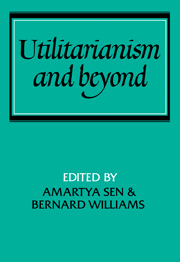Book contents
- Frontmatter
- Contents
- Preface
- Introduction: Utilitarianism and beyond
- 1 Ethical theory and utilitarianism
- 2 Morality and the theory of rational behaviour
- 3 The economic uses of utilitarianism
- 4 Utilitarianism, uncertainty and information
- 5 Contractualism and utilitarianism
- 6 The diversity of goods
- 7 Morality and convention
- 8 Social unity and primary goods
- 9 On some difficulties of the utilitarian economist
- 10 Utilitarianism, information and rights
- 11 Sour grapes – utilitarianism and the genesis of wants
- 12 Liberty and welfare
- 13 Under which descriptions?
- 14 What's the use of going to school?
- Bibliography
9 - On some difficulties of the utilitarian economist
Published online by Cambridge University Press: 30 January 2010
- Frontmatter
- Contents
- Preface
- Introduction: Utilitarianism and beyond
- 1 Ethical theory and utilitarianism
- 2 Morality and the theory of rational behaviour
- 3 The economic uses of utilitarianism
- 4 Utilitarianism, uncertainty and information
- 5 Contractualism and utilitarianism
- 6 The diversity of goods
- 7 Morality and convention
- 8 Social unity and primary goods
- 9 On some difficulties of the utilitarian economist
- 10 Utilitarianism, information and rights
- 11 Sour grapes – utilitarianism and the genesis of wants
- 12 Liberty and welfare
- 13 Under which descriptions?
- 14 What's the use of going to school?
- Bibliography
Summary
Introduction
The economic theory of public policy is relentlessly utilitarian: policies are ranked by their utility consequences. In the context of that theory, I want to discuss three matters: (a) is it reasonable to insist that the utilities of agents depend only on the consequences of public actions? (b) how are we to evaluate actions designed to change the utility function of agents? and (c) how are we to treat the fact that the consequences of actions are uncertain? This of course leaves a good many other questions which it would be interesting to discuss.
Before I consider these problems, a general point seems worth making. The utilitarian stance of Welfare Economics has proved very powerful in the following sense: it has given precise arguments why one policy under precisely stated conditions was to be preferred to all others available. In this way, it has made discussion of policy possible. Even to a nonutilitarian, these Welfare Economics arguments will be relevant and important. But it is difficult to see how they could be decisive. This is so for at least two reasons. The utilitarian requires a cardinalisation of the utility functions of agents and interpersonal comparability of utilities. This cardinalisation cannot be derived from the preferences of agents over social states unless the agents are essentially alike1 and also utilitarians. Moreover, no one has ever attempted to derive such a cardinalisation in practice. Hence different utilitarians with different cardinalisations can come to different policy conclusions. The disagreement between them will turn on their social preferences and it is not clear that it is resolvable.
- Type
- Chapter
- Information
- Utilitarianism and Beyond , pp. 187 - 198Publisher: Cambridge University PressPrint publication year: 1982
- 23
- Cited by



